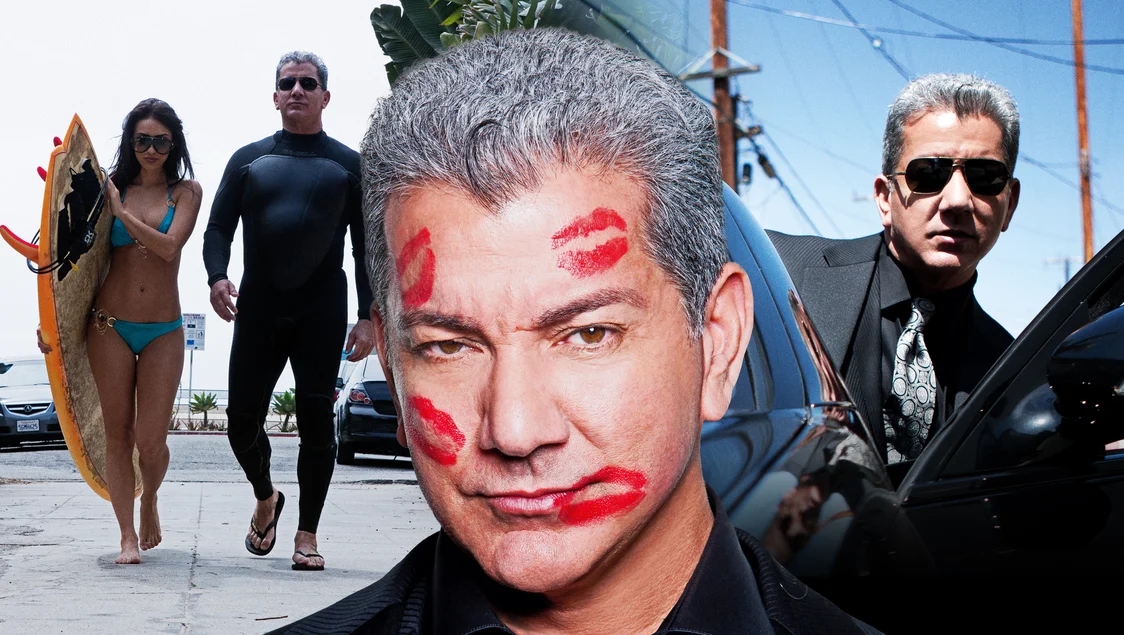
Issue 102
June 2013
"The Veteran Voice of the Octagon" Bruce Buffer chats to Fighters Only about his life in and out of the UFC.
After listening to the dulcet tones of Bruce Buffer introduce and close some 2,000 fights, it’s hard to imagine a time when the ‘Veteran Voice of the Octagon’ wasn’t an integral part of the UFC’s patented presentation. It’s even harder to imagine a time where he had to practically plead for a chance to even try out for the job.
“It took about a year and a half to convince the UFC that I should be the announcer for every single show,” Buffer explains in a Fighters Only exclusive ahead of the worldwide release of his autobiography, It’s Time! My 360º View of the UFC. “I envisioned myself in the Octagon because I’ve been in martial arts since I was 12 years old. It’s a love of mine beyond any other sport, except for surfing. I tried to convince the owners – it was SEG back then and Robert Meyrowitz – to let me announce for them in the Octagon.”
Buffer’s first UFC appearance was in 1996, but it was hardly a VIP invite. In fact, he was left to just about sneak in the venue to get a first shot at his dream gig.
“My first event was UFC 8, where I did the prelims,” Buffer recalls. “I actually got that job because I managed a fighter named Scott ‘The Pitbull’ Ferrozzo. I got Scott into the UFC, but I had an ulterior motive in mind. My ulterior motive was to be able to go to the event as his manager, and lo and behold, when I knew we were going down for UFC 8 in Puerto Rico, I called Robert Meyrowitz and said, ‘Look, I’m coming down with my fighter. I’m bringing my tux. Give me a shot. Put me in the Octagon and let me show you what I got.’ So he agreed to let me do the prelims.”
Given an opportunity to make a name for himself, Bruce nailed his debut and felt certain he had secured a spot with the promotion. Unfortunately, things didn’t go exactly as planned.
He says: “I thought, ‘Great! I did a great job.’ I walked out in front of like 9,000 people. They were doing good pay-per-view buys back then, and I thought, ‘Cool. Here I am. I’m here, and I’m ready to go.’ Lo and behold, they didn’t hire me.
“About six months later, they were doing UFC 10, and they called me up and said, ‘Look, there’s been an incident with the announcer we were using. We need you to come down here. Can you be in Alabama in two days?’ I went down to UFC 10, thought I was going to get hired, and yet again they hired somebody else.
“He had a good voice, but he seemed a little nervous and got a few names wrong, which gave me more fuel to go after them again and say, ‘Guys, I feel like a girl waiting for a date to the prom. What’s going on? Make a decision here.’”
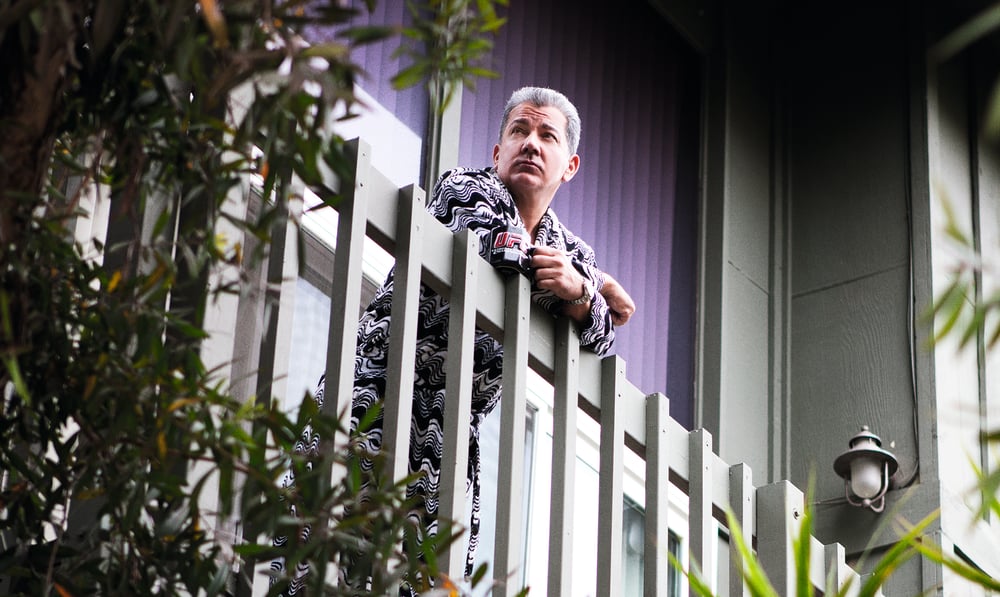
Buffer’s big break would come in 1997 when critically acclaimed sitcom Friends featured the UFC in its third season, and Meyrowitz invited him to appear in the episode as himself alongside fighter ‘Tank’ Abbott and iconic referee ‘Big’ John McCarthy.
“I said, ‘OK, I’ll agree to do it, but I need to talk to you on the set,’” Buffer said. “I met him on the set, and I said, ‘Look, Robert. This is the biggest comedy on TV. I’ve been with you a couple of years now, and you know how I work and what I bring to the table.
“‘I will dedicate myself to helping you build this sport, build this organization, because I believe in it and I love it. But the only way I can do it is if I’m your announcer for every single show and we start developing a working relationship together.’
“That was the best poker hand I ever played. That was UFC 13 I came back for, and since then I’ve only missed two UFCs in the past 16 years.”
It’s been a true dream job for Buffer, a lifelong practitioner of traditional martial arts and second-degree black belt in the Korean art of tang soo do whose grandfather, John ‘Johnny Buff’ Lesky, was boxing’s world bantamweight champion from 1921 to 1922.
Buffer, who also trained in kickboxing and Muay Thai, sparred weekly until he was 32 years old, when a pair of concussions suffered in training led doctors to recommend he end his full-contact fighting days.
“My love for traditional martial arts has always been there. But I left the dojo point-fighting aspect of martial arts in my early 20s, and I got into kickboxing,” he says. “I wanted to fight for real. I wanted to get hit in the head, be able to hit in the head, the whole nine yards. If I was going to train, I wanted to train and fight for real.
“So when the UFC came on in 1993, I understood it. I was totally into it. I got it – the different styles, the whole Bloodsport aspect of it. This was before mixed martial arts was ever a coined term. But I was totally into it. I was like a kid in a candy store.
“I knew that this was a world I was born and bred to be involved with, and I just envisioned myself being in that Octagon. I couldn’t get rid of that dream in my head, and I followed through on my goal and my dream, and I fulfilled it. Now I’m humble, and I kiss the ground every day I wake up being the ‘Voice of the Octagon.’”

Of course, joining the UFC in the early days of the sport also meant battling through a period when mixed martial arts wasn’t viewed as the fastest-growing sport in the world. This was a time when the sport was labeled ‘human cockfighting’ and the UFC wasn’t even allowed to sell its product on pay-per-view. Shrinking crowds and dwindling income meant the late 1990s were an uncertain period for the UFC and its employees.
Buffer admits those times were difficult and even remembers a moment where he feared his career with the promotion, not to mention the promotion itself, was over. He says: “You’ve got to know when to pick up your chips and find another game. You’ve got to realize when it’s not going to work out, when it’s going the wrong direction. There was a moment there, even with all my belief and all my passion in the sport, there was a definite low point for me.
“At UFC 24, when Kevin Randleman slipped on a pipe backstage and knocked himself out, I remember I had to come out to the crowd – and there was only about 1,800 people in the audience, really a low point for us at the time, and we were off pay-per-view – and I had to go out and announce there would be no main event because Kevin had concussed himself.
“I was prepared for bottles and cans to start landing in the Octagon, and I felt like it was the lowest point we were at, and I was really worried and wondered where we were going.”
That question would soon be answered as current UFC owners, Lorenzo Fertitta, Frank Fertitta III and Dana White, purchased the fledgling promotion from then-owners Semaphore Entertainment Group and saved the UFC from bankruptcy.
“When I got the call and was told that Dana White and the Fertitta brothers had bought the UFC, I thought, ‘Wow, this could be the shot. This could be the chance.’ I knew Dana through his management of Tito Ortiz and Chuck Liddell, and I knew he understood the business. But this was a huge undertaking.
“Still, it was a breath of fresh air, and I mentally bow to Dana White, Lorenzo and Frank Fertitta every time I see them because, quite frankly, had they not taken over the UFC, you and I would not be having this interview, period.”
The rest of the UFC’s story has been well told by now. The company continued to lose money until 2005, when the original edition of The Ultimate Fighter proved a smash hit on Spike TV, and the sport’s current popularity boom launched in earnest.
Buffer has been in the center of the Octagon for every one of the company’s landmark moments – from the epic Forrest Griffin vs Stephan Bonnar encounter in the final of The Ultimate Fighter (“That was a major turning point,” Buffer says. “That show allows the old fans and the millions of newbies coming in to begin to understand the sport”). To 2011’s historic UFC 129 event, which saw 55,000 fans fill Toronto’s Rogers Centre; and everything in between.
“I always believed that the UFC would be huge,” Buffer says. “With God as my witness, I believed that from day one, or I never would have jumped in. When I set out to do something, I have to have that belief and that passion to fulfill that goal I’m setting out.
“The moment that I sided myself and my loyalty to the UFC – and more so to Dana White and the Fertitta brothers – to be their loyal soldier and to do everything I could to get it there, I knew they would get there. But I also told myself that the show is not about me. The show is about the fighters. It’s about the UFC brand.
“My role is to do the best job I can walking out there and giving 150% of my mind, my body, my energy everything, every night. That’s my whole thing. I work on the basis of passion.”

Buffer’s passion has become legendary in MMA circles. Moments before he steps into the cage, he can be seen just outside of the Octagon, pumping himself up in a pre-fight routine not too unlike that of the combatants he’s about to introduce.
Rabid Brazilian fans have even taken to echoing Buffer’s signature calls, all the way from the moment he kicks off the evening’s pay-per-view with his famed, ‘We are live!’ to the evening’s main event, ‘It’s time!’ yell.
“When I walk out in Brazil and I hear the 20,000 fans roaring, ‘It’s time!,’ it’s the biggest compliment that anybody in my position could ever receive,” Buffer acknowledges. “I’m completely honored by it, but I’m also completely humbled by it. I’m just out there trying to do the best job I can, and when I receive those accolades, it’s an amazing, humbling experience.”
Outside of the cage, Buffer considers himself a bit of a Renaissance man. His passion for surfing remains intact – a love that he found as a teenager after relocation from frigid Philadelphia to the beaches of sunny Malibu, California.
“It was like a culture shock with all the beautiful blonde girls running around on the beach,” Buffer recalls. “I had a revelation at 15. All I wanted to do was learn how to surf and lose my virginity. I learned how to surf first, and I surfed every day of my life.”
Like his father before him, Buffer also collects antique guns and military artifacts, though he doesn’t consider himself a hunter as much as a defender. “I don’t hunt. I can’t shoot Bambi, but I can definitely shoot a man coming through my window, and then I’ll sit down and have breakfast afterward.”
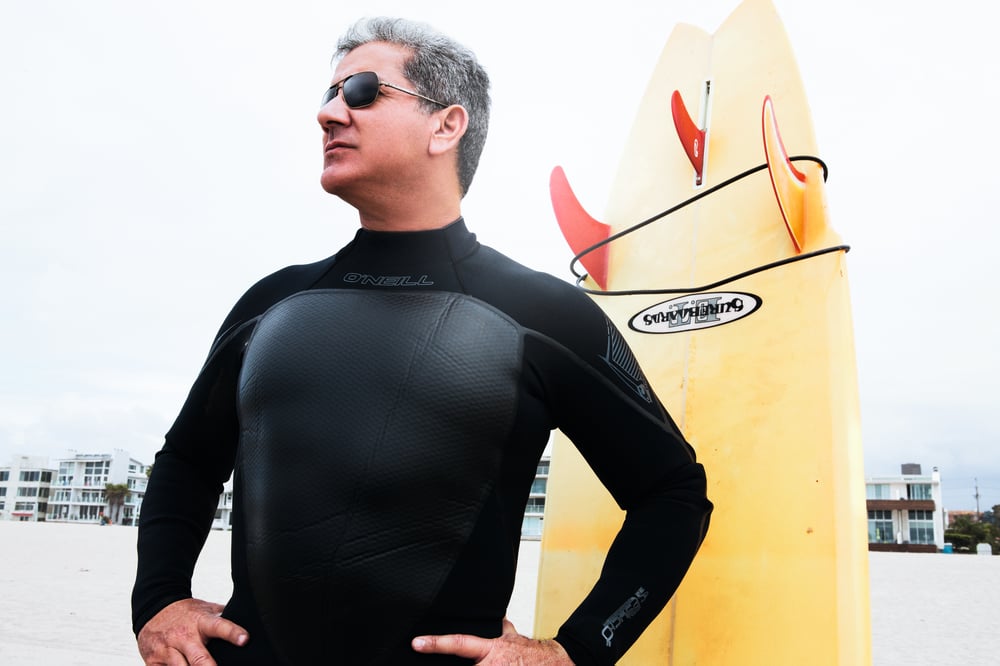
Buffer has also amassed an impressive collection of vintage movie posters and memorabilia, as well as sporting memorabilia focused mostly on pre-1975 items. And there’s the time he spends at the card tables, where he has established himself as a world-rated player on the professional poker circuit. A clothing line, It’s Time Industries, is also readying for a summer launch and should hit retail shelves by 2014. Plus, It’s Time, a mobile app, is currently available on iTunes.
“It’s an amazing life,” admits Bruce, who growing up would hang out at actor Steve McQueen’s house on the beach. “We always wanted to be James Bond when we were kids. I’ve had the pleasure of growing up now, and at this point in my life now, I’m living a life similar to James Bond, but I just don’t have to kill anybody. It’s really a lot of fun.
“There have been many, many high points, and the moment that I think I’ve experienced a high point, it’s just a very short period of time that another high point takes place, whether it’s another great fight or another great moment, and this is a large part of the reason, that I love doing what I do.”
Buffer truly is living a dream. The lifelong martial arts fan has the best seat in the house for each and every UFC event, and he’s often seen signing autographs and taking as many pictures with fans as any of the organization’s superstar fighters.
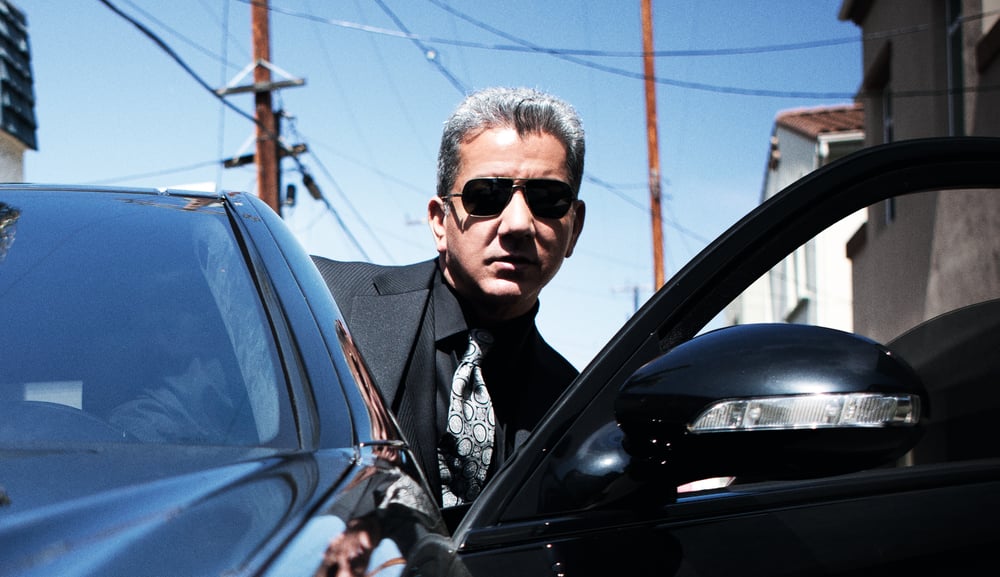
For Buffer, he believes the key to his success has been an insistence to remain true to himself throughout the journey and to be driven by one overriding value: passion.
He says: “When you set out to do something, you have to have passion for it because you’re going to be dealing with ups and downs. You’re going to be knocked to the canvas where you’re going to have to get up. And if you’re not passionate for what you’re doing, if you’re only driven by the potential to earn money, chances are you’re not going to perform and handle the preparation as best as possible.
“So when I set out to do something, I base it all on my passion level in the product – in this case, the product being the UFC – and belief in myself to do the best job I can on the path I chose. You just have to see yourself there and go after it.
“Everybody is an equal. I don’t feel that I’m better than anybody out there. I just try to do the best job I can. I’m a team player, and basically I give my all to make everybody around me better. I feel if I can help make everybody around me better by doing my part to do what I can, then the return to me will be exactly what I want. I just want to create success for the entire thing that I’m working with. Then I know it will all come back to me.”
Bruce on the Stephan Bonnar/Forrest Griffin fight
“The second the fight started, the crowd was on its feet and stayed standing for what turned out to be one of the most amazing fights anyone had ever seen. These were balls-to-the-wall, fighting with every ounce of skill they had, punching, kicking and evading each other ruthlessly. It was amazing to see where this fight was going. You couldn’t imagine that they had this much skill, intensity and desire to win locked away inside them. When it was over, we were all beside ourselves. It was arguably the most real conclusion to a reality show that has ever aired in the history of television.”
Bruce on backing up Chuck Liddell in a bar fight
“You’ll remember from my description of the London street brawl that I watched Chuck defending himself in an alley. We were definitely not feeling any pain that night, and he was still one of the most dangerous human bulldozers you could have encountered in that alley. Watching him work a public street brawl was like watching a movie without the flashy sound effects. He was just swatting people. Swat. Swat. Swipe. So this night down south, BJ and I looked at each other and nodded, knowing that we had best back Chuck up, as something was about to blow up. BJ Stepped in right behind Chuck, glaring at these guys. I took Chuck’s right. We just looked at these guys and watched the threat evaporate from their eyes like sweet tea on Alabama asphalt in June.”
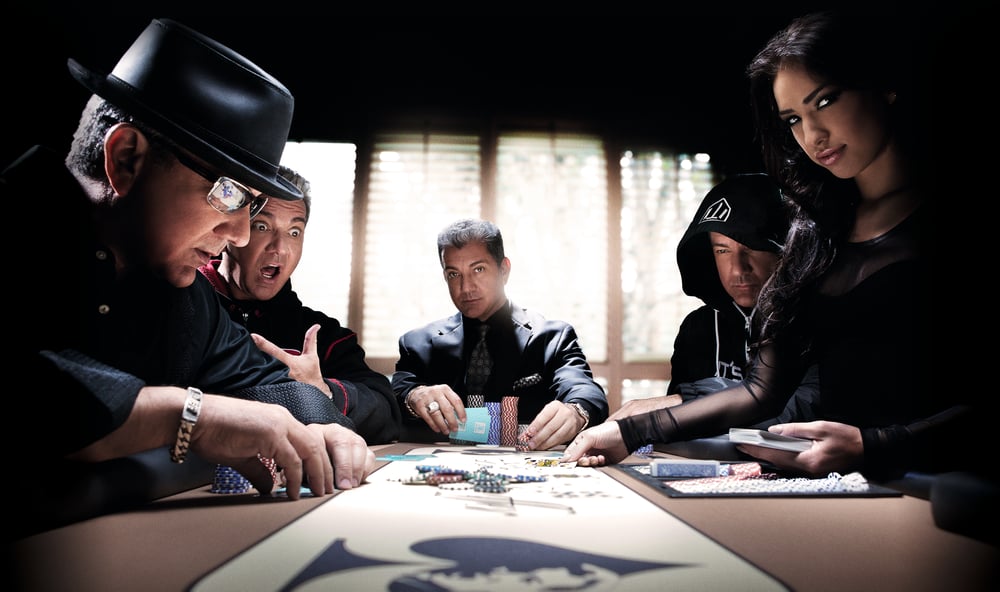
Bruce’s Top 10 tips for mastering poker
- Watch hundreds of hours – seriously! – of poker TV shows and read a poker book
- Watch the instructional video Final Table Poker starring poker pros and yours truly
- Eat right, sleep right, exercise right, play right
- Don’t play with the rent money!
- Never have your girlfriend sit beside you and watch
- Learn the maths. In school it cost you a grade, but on the felt, it can cost you your bank account!
- Don’t fall asleep on the table
- If you want to win, you should never drink more than one drink every four hours, if at all
- Leave the uppers and Adderall at home
- Win like you’re used to it and lose like it doesn’t bother you
Bruce on his love for poker
“My career really started with a poker tournament at the Borgata in Atlantic City. I was in town to announce UFC 53 in 2005, and decided to play my first tourney. I made it all the way through to the final table. The fever took hold of me. I realized I had the skills to play – big. Then, later in 2005, I made the televised final table again at the World Poker Tour’s Celebrity Tournament. It’s the dream of many players to be at that table, and I got in on my second outing. It was only my second tournament, and I came in sixth! I got invited to appear in an instructional poker DVD and started doing more tournaments on the pro circuit. I got world-class rated and became a player with a team called Full Tilt Poker. The more you win, the higher up you go in the annual professional rankings.”
Bruce on women and groupies
“Some of the sexual escapades – or even just sexual innuendo – on the road has gotten crazy over the years. A classic example is the number of times a guy will stop me at an event to introduce me to his wife or girlfriend, and then ask if I can take a picture with her. You know my standard response, ‘Absolutely, yes!’ I go into my patented Bruce Buffer smile and give them a shot they will hopefully treasure (or throw darts at) for years to come.
“But I have to say, sometimes these encounters get weird. ‘Can I get a picture of you kissing my wife?’ guy asks. I decline such requests. Sometimes guys up the ante, ‘Want to sleep with her?’ Uh, no thanks, pal. I can get my own action... Strangely, that has happened twice in the UK. I don’t know why.”
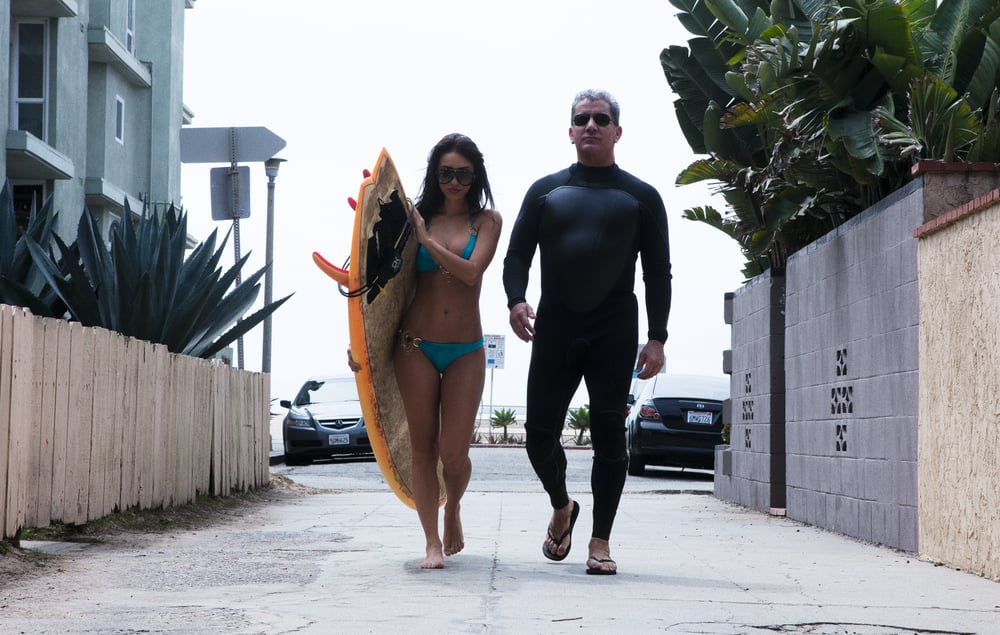
Bruce on growing up in Malibu
“My father got a job offer that took us west to California, land of sunshine, movies, endless beaches, and beautiful girls. My parents rented a house in Malibu, of all places. That probably sounds glamorous, but in fact the 1970s Malibu was not the bastion of wealth it is today. In fact, it seemed to be full of beach bums and a lot of middle-class families like ours. The movie stars were the ones who had the houses on the beach.
“One of our neighbors was Steve McQueen. I used to hang out with his son, Chad. We were hanging out in the family kitchen one day when Steve and Ali McGraw came home from shopping. They had just appeared together in Sam Peckinpah’s film The Getaway, about an ex-con and his girl on the lam. Ali was as beautiful as she was in that movie. Steve shook my hand and said I was always welcome in their home but had to follow one rule: call first before coming over.
“He seemed like the coolest dad ever. He drank beers with us on the beach when we got a little older, and told us some hilarious stories. When we got to know each other a little better, he’d let me use his deck and the awesome sauna downstairs in his house after I was done surfing the beach in front of his house. I regarded him with a mixture of awe and respect. McQueen probably was the coolest of all the leading men at the time.”
Bruce on screwing up lines
“One night, I flubbed Rashad Evans’ introduction to the main event. I got the name of his home city wrong. I was sitting in my living room that Sunday after getting home, and I see there’s a text from Rashad, ‘LOL how many years have you been introducing me? No worries. It’s cool...’ I dialed his number immediately. ‘Who’s this?’ he said groggily. ‘Bruce!’ ‘Bruce, man, thanks for calling. But it’s like, 12.30 in the morning.’ ‘Oh shoot,’ I thought. I thought he was still in Vegas. Turns out he’s lying in bed in Michigan and I just woke him up.”
...
